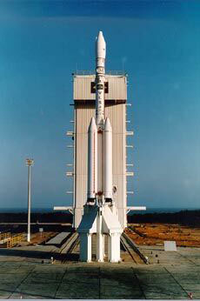
Brazilian rocket explosion
Encyclopedia

Brazilian Space Agency
The Brazilian Space Agency is the civilian authority in Brazil responsible for the country's burgeoning space program. It operates a spaceport at Alcântara and a rocket launch site at Barreira do Inferno...
VLS-1
VLS-1
The VLS - Satellite Launch Vehicle - is the Brazilian Space Agency's main satellite launch vehicle project. The project's goal is to develop a launch vehicle capable of launching small general-purpose satellites into orbit...
rocket
Rocket
A rocket is a missile, spacecraft, aircraft or other vehicle which obtains thrust from a rocket engine. In all rockets, the exhaust is formed entirely from propellants carried within the rocket before use. Rocket engines work by action and reaction...
, which was intended to have launched two satellites into orbit. On August 22, 2003, at 13:30 (local time) an explosion
Explosion
An explosion is a rapid increase in volume and release of energy in an extreme manner, usually with the generation of high temperatures and the release of gases. An explosion creates a shock wave. If the shock wave is a supersonic detonation, then the source of the blast is called a "high explosive"...
destroyed the rocket as it stood on its launch pad
Launch pad
A launch pad is the area and facilities where rockets or spacecraft lift off. A spaceport can contain one or many launch pads. A typical launch pad consists of the service and umbilical structures. The service structure provides an access platform to inspect the launch vehicle prior to launch....
at the Alcântara Launching Center in the state of Maranhão
Maranhão
Maranhão is a northeastern state of Brazil. To the north lies the Atlantic Ocean. Maranhão is neighbored by the states of Piauí, Tocantins and Pará. The people of Maranhão have a distinctive accent...
in northern Brazil
Brazil
Brazil , officially the Federative Republic of Brazil , is the largest country in South America. It is the world's fifth largest country, both by geographical area and by population with over 192 million people...
. Twenty-one people, standing on the launch pad, died when one of the rocket's four first stage motors ignited accidentally. The explosion caused a fire in the nearby jungle brush, and produced a large cloud of smoke that was visible for large distances. This was the third major attempt by Brazil to launch a rocket of the country's own design.
The explosion leveled the rocket's launch pad, reducing a 10-story high structure to a pile of twisted metal. Dozens of kilometers away, residents of the city of São Luís were able to hear the blast. The rocket had been scheduled to launch in just a few days' time and had two satellites onboard when the explosion occurred.
After the explosion, the Brazilian Space Agency was criticized for using solid-fuel rockets, which are easier to build and ignite than liquid-fuel rockets, but also dangerous because they lack throttle
Throttle
A throttle is the mechanism by which the flow of a fluid is managed by constriction or obstruction. An engine's power can be increased or decreased by the restriction of inlet gases , but usually decreased. The term throttle has come to refer, informally and incorrectly, to any mechanism by which...
controls and emergency shut-offs. The incident has caused a significant delay to the Brazilian space program because of government inquiries as well as the fact that many scientist
Scientist
A scientist in a broad sense is one engaging in a systematic activity to acquire knowledge. In a more restricted sense, a scientist is an individual who uses the scientific method. The person may be an expert in one or more areas of science. This article focuses on the more restricted use of the word...
s and engineer
Engineer
An engineer is a professional practitioner of engineering, concerned with applying scientific knowledge, mathematics and ingenuity to develop solutions for technical problems. Engineers design materials, structures, machines and systems while considering the limitations imposed by practicality,...
s who worked on the program died when the rocket exploded.
An investigation by the Brazilian Government after the explosion found "dangerous buildups of volatile gases, deterioration of sensors and electromagnetic interference" at the launch site. The VLS was Brazil's first effort to build a rocket capable of reaching orbit with a commercial payload. The two previous VLS launch efforts had malfunctioned because of engine problems. The explosion was the third consecutive failure for the system. A new version of the launcher is being built with Russian assistance.
The VLS-1 V04 was scheduled for launch in 2006, but the need for separate stage two testing postponed it.

